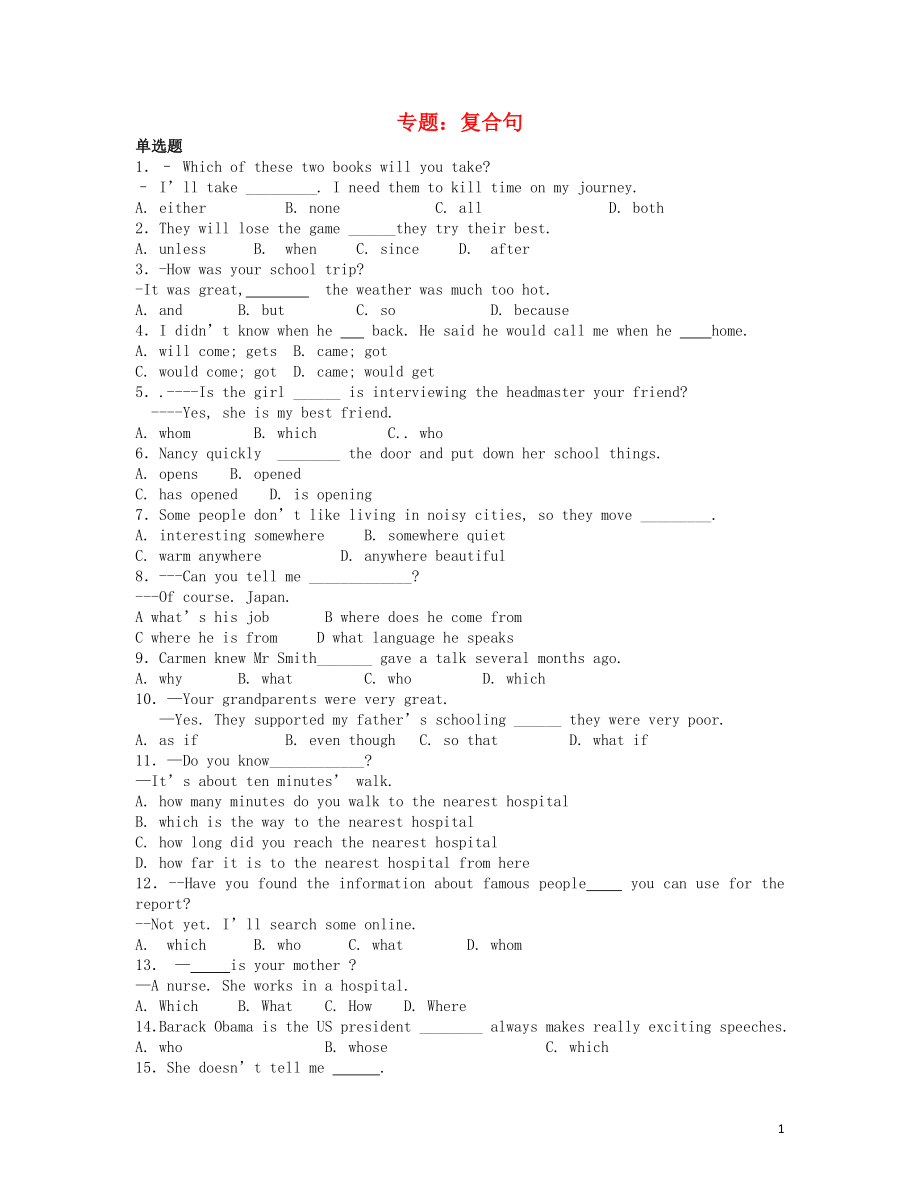《2020年中考英語(yǔ)總復(fù)習(xí) 專(zhuān)題 復(fù)合句練習(xí)題(基礎(chǔ)版含解析)》由會(huì)員分享��,可在線(xiàn)閱讀�,更多相關(guān)《2020年中考英語(yǔ)總復(fù)習(xí) 專(zhuān)題 復(fù)合句練習(xí)題(基礎(chǔ)版含解析)(5頁(yè)珍藏版)》請(qǐng)?jiān)谘b配圖網(wǎng)上搜索。
1�、專(zhuān)題:復(fù)合句
單選題
1.– Which of these two books will you take?
– I’ll take _________. I need them to kill time on my journey.
A. either B. none C. all D. both
2.They will lose the game ______they try their best.
A. unless B. when C. since D. after
3.-
2、How was your school trip?
-It was great, the weather was much too hot.
A. and B. but C. so D. because
4.I didn’t know when he back. He said he would call me when he home.
A. will come; gets B. came; got
C. would come; got D. came; would get
5..----
3�����、Is the girl ______ is interviewing the headmaster your friend?
----Yes, she is my best friend.
A. whom B. which C.. who
6.Nancy quickly ________ the door and put down her school things.
A. opens B. opened
C. has opened D. is opening
7.Some people don’t
4�、like living in noisy cities, so they move _________.
A. interesting somewhere B. somewhere quiet
C. warm anywhere D. anywhere beautiful
8.---Can you tell me _____________?
---Of course. Japan.
A what’s his job B where does he come from
C where he is from D what languag
5�����、e he speaks
9.Carmen knew Mr Smith_______ gave a talk several months ago.
A. why B. what C. who D. which
10.—Your grandparents were very great.
—Yes. They supported my father’s schooling ______ they were very poor.
A. as if B. even
6����、though C. so that D. what if
11.—Do you know____________?
—It’s about ten minutes’ walk.
A. how many minutes do you walk to the nearest hospital
B. which is the way to the nearest hospital
C. how long did you reach the nearest hospital
D. how far it is to the nearest hospital from h
7、ere
12.--Have you found the information about famous people you can use for the report?
--Not yet. I’ll search some online.
A. which B. who C. what D. whom
13. —_____is your mother ?
—A nurse. She works in a hospital.
A. Which B. What C. How D. Where
14.Barac
8、k Obama is the US president ________ always makes really exciting speeches.
A. who B. whose C. which
15.She doesn’t tell me .
A. which room she lived
B. which room she lived in
C.which room does she live
16.If I you, I’d keep quiet and listen carefully in class.
A. am
9���、 B. will be C. were
17. –I didn’t know ______
-Neither did I.
A. what was happened to him B. what the matter was with him
C. what was wrong with him D. where was the History Museum
18.—I hope to make decisions by myself.
—OK. But remember _
10�、____________ you do, you should think about the results.
A. Whenever B. However C. Whatever D. Wherever
19. –The girl _____you talked with at the school gate is our new English teacher.
A. those B. which C. whom D. what
20.Health experts
11����、believe that even a little exercise is better than______ at all.
A. none B. little C. no one D. few
專(zhuān)題:復(fù)合句
1.D
【解析】
試題分析:either兩者中任何一個(gè)都;none一個(gè)也沒(méi)有�����;all所有都����;both兩者都;句意:這兩本書(shū)你要哪一本��?——兩本我都要����。我用來(lái)在路上打發(fā)時(shí)間。結(jié)合語(yǔ)境可知選D���。
2.A
【解析】
試題分析:句意:除非他們盡他們的最大努力���,否則他們將會(huì)丟掉這場(chǎng)比賽��。unless除非���,如果不,引導(dǎo)條件狀語(yǔ)從句���;when 當(dāng)
12�、……時(shí)候�����,引導(dǎo)時(shí)間狀語(yǔ)從句�;since 自從,引導(dǎo)時(shí)間狀語(yǔ)從句����;after 在……之后�����,引導(dǎo)時(shí)間狀語(yǔ)從句�。根據(jù)句意可知選A。
3.B
【解析】
試題分析:句意:---你學(xué)校旅游怎么樣啊��?---好極了����,但是天氣太熱了。and表示承接�����,but但是�����,表轉(zhuǎn)折���,so所以����,because因?yàn)?����。根?jù)題意�����,故選B。
4.C
【解析】
試題分析:句意為:我不知道他什么時(shí)候回來(lái)�。他說(shuō)他到家就會(huì)打電話(huà)給我。根據(jù)語(yǔ)境���,前句是賓語(yǔ)從句�,主句用一般過(guò)去時(shí)�,從句應(yīng)用表示過(guò)去的某種時(shí)態(tài);后句是帶有時(shí)間狀語(yǔ)從句的賓語(yǔ)從句���,從句中主句用過(guò)去將來(lái)時(shí)�,從句應(yīng)用一般過(guò)去時(shí)�����。結(jié)合選項(xiàng)可知應(yīng)選C��。
5.C
【解析】
試題
13����、分析: whom誰(shuí)����,賓格�����。which哪一個(gè)�����,代替物��。who誰(shuí)�,主格�。本句中的定語(yǔ)從句要修飾先行詞the girl,并且連接詞要在句中作主語(yǔ)�,句意:正在采訪(fǎng)校長(zhǎng)的女孩是你的朋友嗎?是的�����,她是我最好的朋友����。故選C。
6.B
【解析】試題分析:句意: Nancy快速地打開(kāi)門(mén)���,然后放下學(xué)習(xí)用品��。句中and連接兩個(gè)并列的謂語(yǔ)動(dòng)詞�����,表示兩個(gè)接連發(fā)生的動(dòng)做���。put down用的是一般過(guò)去式����,所以前面也用動(dòng)詞的一般過(guò)去式���,故選B��。
7.B
【解析】
試題分析:句意:一些人不喜歡居住在吵鬧的城市里��,因此他們搬到了安靜的地方���。分析:考查形容詞疑問(wèn)副詞的用法,形容詞要位于其后面���。故選B
8.C
【解析
14���、】
這題考查疑問(wèn)句做賓語(yǔ)從句的用法�,賓語(yǔ)從句要變成陳述句語(yǔ)序�����,在根據(jù)答語(yǔ):Japan��,說(shuō)明是問(wèn)從哪里來(lái)的�����。選C���。
9.C
【解析】此題考查的定語(yǔ)從句的相關(guān)知識(shí),因其先行詞是 Mr Smith����,故其引導(dǎo)詞應(yīng)用who或that。
10.B
【解析】
試題分析:句意:——你的祖父母是非常偉大的�。——是的��。盡管他們很窮��,他們支持我父親上學(xué)。A. as if 仿佛����,好像;B. even though 盡管��,即使�����;C. so that 以便于����;D. what if倘若,假使���;結(jié)合句意��,前半句表示支持上學(xué)���,后半句表示家里窮,前后表示讓步關(guān)系��,故用連詞even though。故選B���。
11
15�、.D
【解析】本題考查特殊疑問(wèn)句作賓語(yǔ)從句的語(yǔ)序����。本題回答語(yǔ)的含義為步行大約需要10分鐘的路程�����,對(duì)此提問(wèn)應(yīng)該用多遠(yuǎn)的疑問(wèn)短語(yǔ)how far��,后跟句子的陳述順序��。而how many對(duì)于數(shù)量提問(wèn)���,which對(duì)于事物類(lèi)別提問(wèn)����,how long對(duì)時(shí)間長(zhǎng)度提問(wèn)��,后三者的意思與本題不符�,同時(shí)ABC選項(xiàng)的順序也不正確,故本題選D。
12.A
【解析】
試題分析:句意:--你已經(jīng)找到一些����,能用到你的這篇報(bào)告中的名人的信息了嗎?--還沒(méi)有���。我將要用網(wǎng)絡(luò)收集一些��。分析:考查定語(yǔ)從句:先行詞為information信息��,先行詞在從句中做use(用)的賓語(yǔ)�����,先行詞是事物并且在從句做賓語(yǔ)��,因此用which引導(dǎo)�。
16���、故選 A
13.B
【解析】
試題分析:句意:你媽媽是干什么的��?護(hù)士��,她在醫(yī)院工作���。對(duì)職業(yè)的提問(wèn)用疑問(wèn)詞what�;A 哪一個(gè)����;C 怎么樣;D 哪里��。結(jié)合語(yǔ)境故選B��。
14.A
【解析】
試題分析:A. who誰(shuí)�����,引導(dǎo)從句代替人�����,B. whose 誰(shuí)的��,C. which哪一個(gè)�����,引導(dǎo)從句代替物���。句意:奧巴馬是一位總是能做出令人興奮的演講的美國(guó)總統(tǒng)����。 本句中who引導(dǎo)的定語(yǔ)從句修飾先行詞the US president���,并且who要在從句中作主語(yǔ)�����。故選A�。
15.B
【解析】
試題分析:句意為:她沒(méi)有告訴我她住在哪個(gè)房間��。在賓語(yǔ)從句中����,應(yīng)用陳述句的語(yǔ)序。疑問(wèn)詞在句中充當(dāng)賓語(yǔ)成分�,由
17、于live是不及物動(dòng)詞��,應(yīng)用介詞接賓語(yǔ)��。故應(yīng)選B��。
16.C
【解析】
試題分析: 與現(xiàn)在事實(shí)相反:條件從句用動(dòng)詞過(guò)去式,主句用would/could/should/might+動(dòng)詞原形��;與過(guò)去事實(shí)相反:條件從句用had done�,主句用would/could/should/might+have done;與將來(lái)事實(shí)相反:條件從句用動(dòng)詞過(guò)去式/should+動(dòng)詞原形/were to do���,主句用would/could/should/might+動(dòng)詞原形�����。句意:如果我是你��,我上課就會(huì)保持安靜��,認(rèn)真聽(tīng)課��。故選C。
17.C
【解析】
試題分析:句意:---不知道他怎么了����?----我也不
18、知道���。疑問(wèn)詞引導(dǎo)的賓語(yǔ)從要用陳述語(yǔ)序�,且時(shí)態(tài)要保持一致,故選C.
18.C
【解析】
試題分析:Whenever無(wú)論什么時(shí)候�;However無(wú)論怎樣;Whatever無(wú)論什么����;Wherever不管哪兒。句意:我希望能自己做決定�����?�!冒?���!記住無(wú)論你做什么,你都應(yīng)該考慮后果����。結(jié)合語(yǔ)境可知選C。
19.C
【解析】
試題分析:句意:在學(xué)校大門(mén)口和你說(shuō)話(huà)的那個(gè)女孩是我們的新英語(yǔ)老師�。在定語(yǔ)從句中如果先行詞是人那么我們用who來(lái)引導(dǎo),故選C.
20.A
【解析】
試題分析:句意:健康專(zhuān)家說(shuō)甚至是一些運(yùn)動(dòng)也要比沒(méi)有運(yùn)動(dòng)好��。none一個(gè)也沒(méi)有�����;little幾乎沒(méi)有,修飾不可數(shù)名詞�����;no one沒(méi)有人����;few幾乎沒(méi)有,修飾可數(shù)名詞����。根據(jù)題意,故選A�。
5
 2020年中考英語(yǔ)總復(fù)習(xí) 專(zhuān)題 復(fù)合句練習(xí)題(基礎(chǔ)版含解析)
2020年中考英語(yǔ)總復(fù)習(xí) 專(zhuān)題 復(fù)合句練習(xí)題(基礎(chǔ)版含解析)

